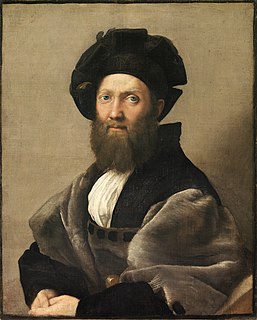A Quote by Baldassare Castiglione
Beauty, I believe, comes from God; therefore, there can be no beauty without goodness.
Related Quotes
God who is goodness and truth is also beauty. It is this innate human and divine longing, found in the company of goodness and truth, that is able to recognize and leap up at beauty and rejoice and know that all is beautiful, that there is not one speck of beauty under the sun that does not mirror back the beauty of God.
In the most general terms, the Enlightenment goes back to Plato's belief that truth and beauty and goodness are connected; that truth and beauty, disseminated widely, will sooner or later lead to goodness. (While we're making at effort at truth and goodness, beauty reminds us what we're hold out for.)
But there is a beauty every girl has—a gift from God, as pure as the sunlight, and as sacred as life. It is a beauty that all men love, a virtue that wins all men's souls. That beauty is chastity. Chastity without skin beauty may enkindle the soul; skin beauty without chastity can kindle only the eye. Chastity enshrined in the mold of true womanhood will hold true love eternally.
Beauty comes in many forms-and there is no form more beautiful than you. Just exactly as you are, this minute, right now, without changing a thing...you are beautiful. Beautiful enough to take God's breath away. You do believe this, don't you? Oh, you must. You must. How can I believe in my beauty if you don't believe in yours?
Christianity sees plants and flowers as created by God to show forth and share with humans the divine goodness, beauty and truth - the purpose of all Creation. In this flowers may be enjoyed simply and directly in themselves as showing forth God's goodness and beauty, or, more fully, as archetypes, signatures, symbols, and bearers of legends, mirroring the revealed articles of Christian faith - thereby serving as means for their teaching, recollection, contemplation and celebration.
The closer we are to God, to divine attributes - such as absolute truth, goodness, and beauty - the more we wonder. When we separate ourselves from truth, goodness, and beauty, we lose wonder and become cynical. The Enlightenment was basically the narrowing of our vision to a purely scientific, empirical, rationalistic worldview, screwing down the manhole covers on us so we became squinting underground creatures.
The beauty in the story is at one with suffering. That is also part of our upbringing - we don't think there could be beauty
otherwise. Beauty is the result of having been through an experience all the way through to the end - therefore it has a poignancy. Beauty that is
singular always comes from following an experience to the point where you can go no further.
It is not expensive to be beautiful. It takes only a little effort to be presentable and beautiful. But it takes some effort. And unfortunately people think of beauty as luxury, beauty as frivolity, ... or extravagance. Beauty is a discipline, beauty is art, is harmony, in the ideological sense and in the theological sense, beauty is God and love made real. And the ultimate reach in this world is beauty.






































